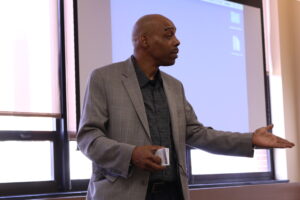
Mark A. Clements was just 16 years old when he was taken into police custody. On his account of the experience in a Chicago Police Department room, he was interrogated and tortured into a false confession for a crime he did not commit. With no youth officer or parent present to protect him, Clements did not know his rights, and was unable to protect himself against the officers.
Clements’ presented his experiences at a presentation held by the Maroon Book Club and commented on the condition of mass incarceration and the prison system, and each’s effects on minority communities. The event was part of the book club series which meets regularly in Robinson Hall.
Clements described his ordeal with the officers and explained the tactics they used to assault and violate him and other young men arrested around this time period in Chicago, Illinois.
“The victims during this corrupted period described being beaten, burned with cigarette butts, [having] alligator clips attached to their bodies, being chained to radiators,” Clements said. “Some were even tossed out of the window.”
Electricity and cattle-prods were tools used by the police department to sexually assault Clements’ genitals, causing him to falsely confess in order to make the “indescribable pain” stop.
The charge that sentenced him to life in prison without the possibility of parole was arson on an apartment building that killed four people. In September of 1982, he stepped into jail with the mindset that he would never see the outside world again.
The jury convicted Clements eight years before journalist John Conroy broke the story of torture in Chicago police stations. The violent assaults were mostly aimed at extracting confessions from African American or Latino suspects, some of whom turned out to be innocent.
Clements was released 28 years after his conviction in August of 2009 following a visit by Bernadine Dohrn, who wanted to interview juvenile inmates sentenced to life without the possibility of parole. Because Clements was convicted without any forensic evidence, Dohrn fought for a retrial.
“When I got out, I was old but I was a kid mentally,” Clements said. “I was taught nothing. You take a kid who has never paid a bill before and you lock him in a room for 23 hours a day and then one day you just kick him out and tell him to enjoy his life. It’s impossible to rehabilitate.”
Clements is now a speaker who protests the prison system and mass incarceration. He is currently on an east coast tour, speaking to students and current inmates about his ordeal and how there are better ways to decrease crime. He works for the National Alliance Against Racism and Political Repression and the No Death Penalty Organization.
“Hearing somebody who personally suffered through the system in a way that, me as a white person, may never have to experience really tells me that I’m very lucky to be in this society in the position I am,” senior sociology major Justin Leso said. “The speech was extremely moving, I had to hold back tears.”

























































































































































!["Working with [Dr. Lynch] is always a learning experience for me. She is a treasure,” said Thomas. - Staff Writer / Kacie Scibilia](https://thewhitonline.com/wp-content/uploads/2025/04/choir-1-1200x694.jpg)








































